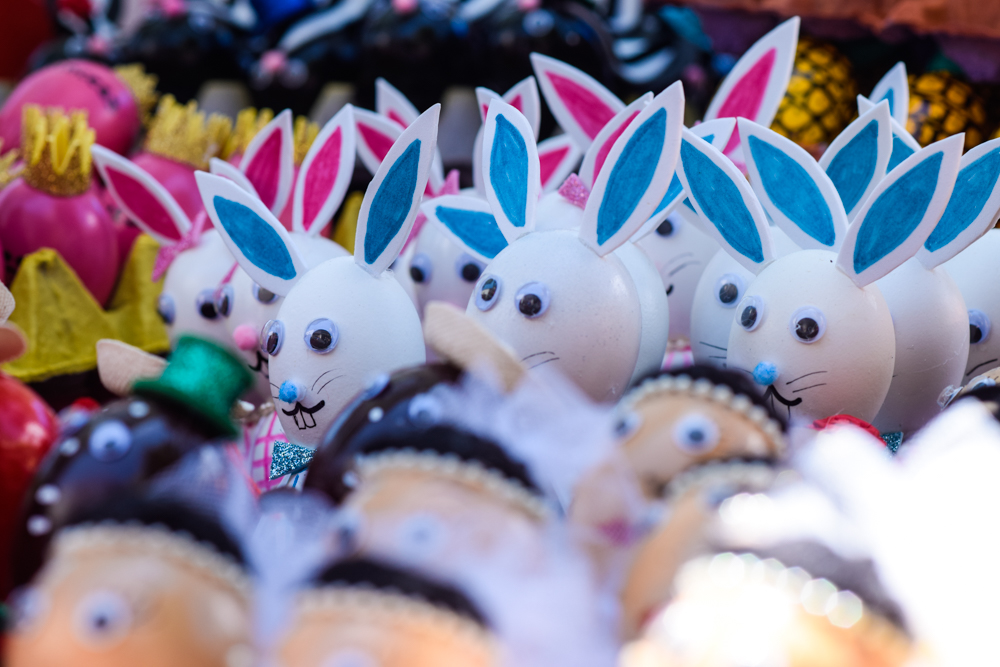Agency Apologizes for Hard-Boiled Cascarón Tax Raid
List of Fiesta Booth Vendors Had Been Given to State

Information trickled from state offices like confetti falling from cascarón-crowned heads on Friday, ending in an apology issued from the California Department of Tax and Fee Administration: “It was not our intention to alarm anyone in Santa Barbara or to single out any community, and we apologize if the department’s actions caused any misunderstanding or apprehension,” agency spokesperson Paul Cambra wrote in an email. Bilingual agents from Tax and Fee had swept through Fiesta sidewalk vendors on Wednesday, telling them it was a misdemeanor to sell without a state seller’s license and that their goods could be confiscated.
State Senator Hannah-Beth Jackson blasted the state tax agents’ behavior and shared her feelings with the head of the agency involved as well as the department head. “They were mortified, embarrassed, and appalled,” Jackson said, “as well they should be.” Jackson said she found it offensive the tax agents were targeting people of limited means. “We’re talking people trying to stretch a penny into a nickel,” she said. “They will have to find a way to go after the real tax dodgers.”
Jackson said she found the whole thing incredible. “It was one of those, ‘What are they doing?’ moments. It’s what’s what they call WTF.” The tax agency in question is relatively new, having been created out of the ashes of the Bureau of Equalization (BOE), which was recently abolished in the wake of statewide scandal. “This is the sort of conduct one would have expected from the BOE,” Jackson said, adding, “There are some bells you can’t un-ring, but there is the expectation this will never happen again.”
Wednesday’s tax raid on cascarón vendors was a surprise to Old Spanish Days officials, though they’d given the state tax agency their list of vendors at the mercados and other Fiesta locales when asked. “We just don’t know what caused them to come from Sacramento,” said Old Spanish Days spokesperson Dave Bolton. “No one expected it.” According to the business cards the agents had used to identify themselves, they had come from the Fresno/Santa Clarita field office.
Too many confetti-egg sellers have been crowding State Street sidewalks, brought up from Los Angeles for “years and years,” said Barbara Carroll, first vice president for the Fiesta organization this year. Police have had to move the vendors when they leave too little room for pedestrians, especially during crowded times like this afternoon’s horse parade. She added that the out-of-town cascarón makers bring in eggs by the “truckloads” and that they fill them with mylar, a non-biodegradable plastic that gets into the creeks and ocean. Santa Barbara cascarón makers, she said, know to use paper confetti.
A quick survey of Friday afternoon’s crowd turned up no cascarón sellers from Los Angeles, however. All the egg vendors The Independent spoke with were from Santa Barbara, one of whom had been working all year to make her cascarones. Many of the sellers were family operations, having worked together to make the eggs and selling near each other. One said her eggshells came from Ventura and that she knew she would have to start paying taxes next year. The vendors who were here from Los Angeles were selling flower ornaments and small bubble machines.
Members of both Old Spanish Days and the Santa Barbara Downtown organization have said that the confetti has been making an increasing mess and that there are just too many sellers. State tax authorities have taken a greater interest in Fiesta in recent years, which has booths selling things as varied as tortas and David Bowie onesies this year. There’s been a cascarón creep, as well, with the eggs showing up at Solstice and Montecito’s Fourth of July parade.
Another Old Spanish Days official, who wished to comment off the record, thought the agents had handled it well, giving warnings only. According to Paul Cambra, the tax agency spokesperson, the agents were checking for compliance and educating those who weren’t aware they needed a permit when they sold more than three retail items. Cascarones generally sell for 25-50 cents each. Cambra said he’d have to check on what the agency policy would be on taxing lemonade stands or high-school car washes.
“When you do it regularly, you are required to have a seller’s permit,” Cambra said, adding that the permits are free. He believed it was more of a misunderstanding that the vendors had felt they were being threatened with misdemeanors and that their cascarones would be seized.
Friday evening, Cambra sent an email that said: “Our Statewide Compliance and Outreach Program teams travel the state to educate local businesses and sellers on tax laws, which can be confusing to many people. It was not our intention to alarm anyone in Santa Barbara or to single out any community, and we apologize if the department’s actions caused any misunderstanding or apprehension. We are reviewing our outreach efforts to assess how we interact with microbusinesses and individuals who may be selling goods only occasionally. Our presence at this event was intended to be an educational outreach effort, and we appreciated meeting with the local community. Our outreach for this event has concluded.”


